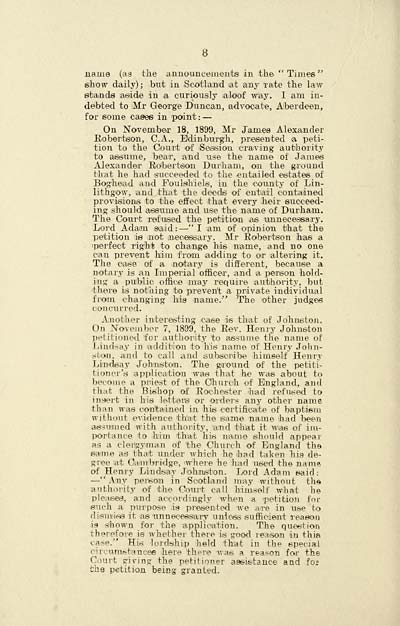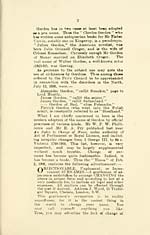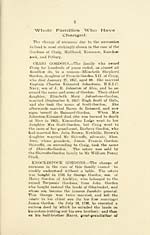Name of Gordon
(10) Page 8
Download files
Complete book:
Individual page:
Thumbnail gallery: Grid view | List view

8
nanie (as the announcements in the " Times"
show daily); but in Scotland iat any rate the la'vv
stands aside in a curiously aloof way. I am in-
debted to Mr George Duncan, advocate, Aberdeen,
for some cases in point : —
On November 18, 1899, Mr Janiee Alexander
Robertson, C.A., Edinburgh, presented a peti-
tion to the Court of Session craving authority
to assume, bear, and use the name of James
Alexander Robertson Durham, on the ground
that he had succeeded to the entailed estates of
Boghead and Foulsh'iels, in the county of Lin-
lithgow, and that the deeds of entail contained
provisions to the effect that every heir succeed-
ing should assume and use the name of Durham.
The Court refused the petition as unnecessary.
Lord Adaim ©aid: — "I am of opinion that the
petition is mot necessary. Mr Robertson has a
'perfect right to change his name, and no one
can prevent him from adding to or altering it.
The ease of a notary is different, because a
notary is an Imperial officer, and a person hold-
ing a public office may require authority, but
there is nothing to prevent a private individual
from changing Ms name/' The other judges
concurred.
Another interesting case is that of Johnston.
On November 7, 1899, the Rev. Henry Johnston
petitioned for authority to assume the name of
Lindsay in 'addition to his name of Henry John-
ston, and to call and subscribe himself Henry
Lindsay Johnston. The ground of the petiti-
fcioner J s application was that he was about to
become a priest of the Church of England, and
that the Bishop of Rochester had refused to
insert in his letters or orders any other name
than was contai nod in his certificate of baptism
without evidence that the same name had been
assumed with authority, and that it was of im-
portance to him that his name should appear
as a clergyman of the Church of England the
same as that under which he bad taken his de-
gree at Cambridge, -where he had used the nam 6
of Henry Lindsay Johnston. Lord Adam said:
—"Any person in Scotland may without the
authority of 'the Court call himself what he
pleases, and accordingly when a petition for
such a purpose as presented we aire in use to
dismiss it as unnecessary unless sufficient reason
is shown for the application. The question
therefore is whether there is good reason in this
case." His lordship held that in the special
circumstances here there was a. reason for the
Court giving the petitioner assistance and for
the petition being granted.
nanie (as the announcements in the " Times"
show daily); but in Scotland iat any rate the la'vv
stands aside in a curiously aloof way. I am in-
debted to Mr George Duncan, advocate, Aberdeen,
for some cases in point : —
On November 18, 1899, Mr Janiee Alexander
Robertson, C.A., Edinburgh, presented a peti-
tion to the Court of Session craving authority
to assume, bear, and use the name of James
Alexander Robertson Durham, on the ground
that he had succeeded to the entailed estates of
Boghead and Foulsh'iels, in the county of Lin-
lithgow, and that the deeds of entail contained
provisions to the effect that every heir succeed-
ing should assume and use the name of Durham.
The Court refused the petition as unnecessary.
Lord Adaim ©aid: — "I am of opinion that the
petition is mot necessary. Mr Robertson has a
'perfect right to change his name, and no one
can prevent him from adding to or altering it.
The ease of a notary is different, because a
notary is an Imperial officer, and a person hold-
ing a public office may require authority, but
there is nothing to prevent a private individual
from changing Ms name/' The other judges
concurred.
Another interesting case is that of Johnston.
On November 7, 1899, the Rev. Henry Johnston
petitioned for authority to assume the name of
Lindsay in 'addition to his name of Henry John-
ston, and to call and subscribe himself Henry
Lindsay Johnston. The ground of the petiti-
fcioner J s application was that he was about to
become a priest of the Church of England, and
that the Bishop of Rochester had refused to
insert in his letters or orders any other name
than was contai nod in his certificate of baptism
without evidence that the same name had been
assumed with authority, and that it was of im-
portance to him that his name should appear
as a clergyman of the Church of England the
same as that under which he bad taken his de-
gree at Cambridge, -where he had used the nam 6
of Henry Lindsay Johnston. Lord Adam said:
—"Any person in Scotland may without the
authority of 'the Court call himself what he
pleases, and accordingly when a petition for
such a purpose as presented we aire in use to
dismiss it as unnecessary unless sufficient reason
is shown for the application. The question
therefore is whether there is good reason in this
case." His lordship held that in the special
circumstances here there was a. reason for the
Court giving the petitioner assistance and for
the petition being granted.
Set display mode to:
![]() Universal Viewer |
Universal Viewer | ![]() Mirador |
Large image | Transcription
Mirador |
Large image | Transcription
Images and transcriptions on this page, including medium image downloads, may be used under the Creative Commons Attribution 4.0 International Licence unless otherwise stated. ![]()
| Histories of Scottish families > Name of Gordon > (10) Page 8 |
|---|
| Permanent URL | https://digital.nls.uk/95611955 |
|---|
| Description | A selection of almost 400 printed items relating to the history of Scottish families, mostly dating from the 19th and early 20th centuries. Includes memoirs, genealogies and clan histories, with a few produced by emigrant families. The earliest family history goes back to AD 916. |
|---|

